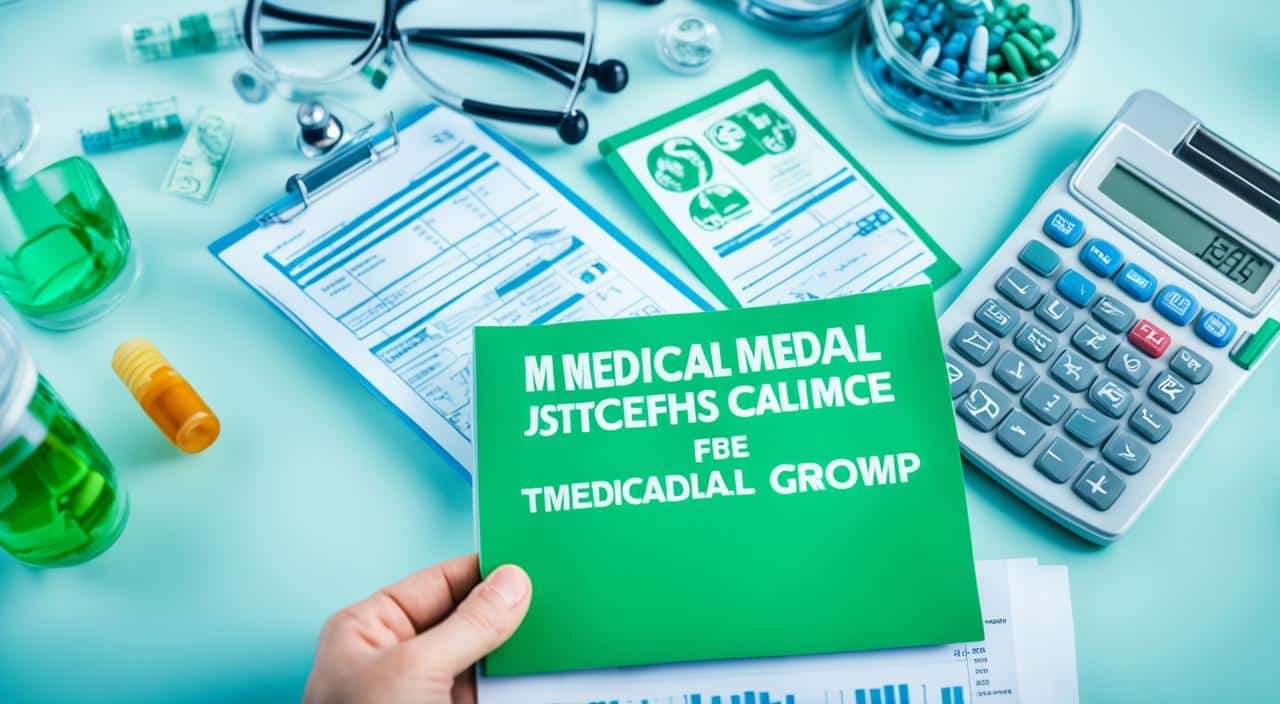When you face sudden medical expenses and insurance isn’t enough, medical loans can be a big help. They are loans meant for healthcare costs. These loans let you pay for anything from health check-ups to urgent surgeries. Knowing about these loans helps you choose wisely when you need to borrow money for health reasons.
Medical loans are like personal loans for healthcare needs. They usually cost less than using your credit card. Plus, they have set interest rates and clear payback plans. This makes it easy to plan your budget around making regular payments.
Getting a medical loan is quick. You can apply and get approved online fast, often within days. This speed is crucial for urgent medical needs, ensuring you can start the treatment right away.
It’s easier to get a medical loan even if your credit isn’t top-notch. But, if your credit score is low, your loan’s interests or how you pay it back might not be as good. Still, these loans are good for helping anyone get the healthcare they need.
Many Americans find it hard to pay for healthcare. Statistics show one in four have struggled in the last year. Here, medical loans become a vital option to make healthcare more reachable without causing a financial strain.
Key Takeaways
- Medical loans are personal loans specifically designed to cover medical and dental expenses.
- These loans typically offer lower interest rates compared to credit cards, making them a more cost-effective financing option.
- Medical loans often have fixed interest rates and repayment terms, providing borrowers with predictable monthly payments.
- Individuals with less-than-perfect credit may still be eligible for medical loans, though they may not receive the most favorable rates and terms.
- One in four Americans have reported difficulty paying for healthcare in the past 12 months, highlighting the growing need for solutions like medical loans.
Understanding Medical Loans
Facing sudden medical bills? A medical loan could be your answer. Especially when other loans might not fit the bill. Let’s explore what medical loans are, their purpose, and what sets them apart from usual personal loans.
Definition of Medical Loans
A medical loan steps in to cover only health costs. It can pay for surgeries, IVF treatments, or emergency medical expenses. Unlike a regular personal loan, medical loans help with only health matters.
Purpose and Use Cases
Need help paying for medical care not fully covered by insurance? That’s where a medical loan steps in. It bridges the gap between what your insurance pays and your medical bill. This is great for big medical costs, especially for those with high-deductible health plans.
Unsecured vs. Secured Medical Loans
Medical loans usually do not need anything as a guarantee. This means they are open to more people, even with bad credit. But, having a good credit scores you lower interest rates. For those with bad credit, you might need to pledge something, like your house, for a secured loan.
How Medical Loans Work

Getting a medical loan is easy. You can request a personal loan online or at a bank. Make sure to check your options without affecting your credit score. You need to show them your credit report, prove your job pays well, and provide other details.
Application Process
Applying for a medical loan is much like any personal loan. The bank looks at your credit history and income. They also consider other financial factors. If your credit is good, you might get lower interest rates and a higher loan amount.
Funding Timeline
After getting approved, you might get the money the next business day. This fast funding is great for sudden medical bills.
Repayment Terms
You pay back what you borrowed in fixed monthly amounts once you get the money. Each payment will also cover the interest on the loan. You should see how much the interest cost is to compare different medical loans. You can pick a repayment plan that works for you, usually from one to seven years.
Where to Get Medical Loans
When you need a medical loan, there are many places to turn. You can check with online lenders, banks, credit unions, or even healthcare providers. Each offers different paths to help you finance your medical needs.
Online Lenders
Online lenders are a top pick for medical financing today. They make it easy to apply, provide funds quickly, and have good rates. Companies like SoFi, Avant, and Upstart may offer personal loans for medical expenses. The whole process is usually quicker than with traditional lenders, which is very helpful for urgent needs.
Banks and Credit Unions
Banks and credit unions can also help with medical loans. They might have personal loans for medical procedures or other healthcare costs. While it takes more time than online applications, they often offer lower interest rates for those with good credit.
Healthcare Providers
Healthcare providers could be another solution for getting a medical loan. This option allows for a more direct approach, tailored by the provider to fit the patient’s needs. Patients must check the details carefully, including interest rates and loan terms, before agreeing.
When looking at medical financing, don’t just focus on the APR. Consider things like eligibility requirements, loan terms, and fees too. Thinking about all these points helps you find the best medical financing for you.
Pros and Cons of Medical Loans
Thinking about a medical loan? It’s crucial to look at the benefits and the downsides. Medical loans can be a big help, but they have their trade-offs. It’s good to know both sides before you decide.
Predictable Payments
Medical loans offer a steady monthly payment. With fixed rates and terms, you know exactly what you owe each month. This beats credit cards, where rates can change and payments vary.
Fast Funding
Medical loans get you money quickly. Lenders often give approval and transfer funds in a few days. This fast process helps with urgent medical costs.
Less Expensive than Credit Cards
Compared to credit cards, medical loans have lower rates. Credit cards usually charge over 20% interest. Lower rates save money, especially for those with good credit.
Flexible Usage
You can use a medical loan for many medical costs. It covers elective, daily, and emergency needs. This flexibility meets various treatment needs.
Interest Charges
Medical loans have interest charges, though they’re usually lower than credit cards. However, these costs can add up over a long loan term or with a big loan amount.
Costly for Bad Credit Borrowers
If your credit is bad, medical loans might cost more. You could face higher rates and less attractive terms. So, they might not be the best choice for everyone.
Limited Loan Amounts
Medical loans often have maximum loan amounts, from $1,000 to $50,000. This limit might not cover all your needs, especially if your treatment is very expensive. You might need to look at other ways to finance your medical expenses.
Medical Loans for Bad Credit

When you look into medical loans, you might be surprised. Even if your credit isn’t great, you could still get help. Yet, getting the best interest rates might be tough. For most unsecured medical loans, you need good credit, at least 670.
If your credit history isn’t good, don’t lose hope. There are special medical loans for bad credit available. These loans might not have the best interest rates. And the terms might not be the most favorable. But they are a way to get the money you need for medical costs.
When exploring your options, be thorough. Look at the interest rates, loan amounts, and repayment plans. Compare different medical loan offers to see which is best for you. Also, look at other ways to pay for medical care. Things like personal loans, credit cards, and payment plans from your doctor can also help.
Factors to Consider When Choosing a Medical Loan

Looking into different medical loan choices requires focusing on a few important things. It’s vital to choose wisely to match both your money and health needs. Factors like interest rate, alternative options, and loan disbursement matter a lot. They affect how much you pay and how easy it is for you to use the personal loan for medical reasons.
Interest Rate
The interest rate for a medical loan can change, from about 4.99% to 35.99%. People with good credit often get lower rates. Bad credit could mean you pay more.
Alternative Options
Before you choose a medical bill loan, check out other ways to pay. You might find options that are cheaper. For instance, you could talk to your doctor about a payment plan. Or, look into raising money online with sites like GoFundMe.
Loan Disbursement
Know how you’ll get the loan funds. Some places give the money straight to you. Others send it right to the doctor’s office. This can change how easy it is for you to pay for your care on time.
Monthly Payment Affordability
Make sure you can afford the monthly payments on your medical loan. Stretching your budget too thin is risky. It could lead to late payments and harm your credit score.
Total Interest Cost
Remember to figure out how much interest you’ll pay in total. This shows the true expense of the personal loan. It will help you decide if it’s the best move for your medical costs.
| Factor | Considerations |
|---|---|
| Interest Rate | Ranges from 4.99% to 35.99%, with lower rates for borrowers with good credit |
| Alternative Options | Payment plans, crowdfunding, and other financing options should be explored |
| Loan Disbursement | Funds may be sent directly to you or the healthcare provider |
| Monthly Payment Affordability | Ensure the monthly payments fit within your budget to avoid late payments |
| Total Interest Cost | Calculate the total interest paid over the life of the loan |
Alternatives to Medical Loans
Before getting a medical loan, look into other ways to finance your needs. You might find options that are better for you. These can be more flexible, affordable, or offer support tailored to your situation.
Payment Plans
A medical loan can be replaced by a payment plan. Many hospitals and doctors are open to arranging these plans. They help spread out the cost without extra interest.
Hospital Financial Assistance
Some hospitals have aid for those in financial need. Depending on your income and financial state, you could get discounts or free care. This could lessen your financial worry greatly.
Crowdfunding
Using crowdfunding is a way to ask for help online. Friends, family, and others can donate. It’s a great option when other financial choices aren’t available.
Credit Cards
Credit cards with 0% interest are good for smaller medical needs. If you can pay it back within the free period, it’s a cost-effective choice for the short term.
Medical Credit Cards
Medical credit cards could also help, but they might not be as great as they seem. Make sure you understand the fees and terms. It’s crucial they match your budget and plans well.
Medical Loans
Eligibility is crucial for medical loans. You usually need a good credit score of 670 or higher. This helps you get the best interest rates. But, if your credit isn’t perfect, getting a loan for medical needs can be tough.
Also Read: What Is A Reverse Mortgage And How Does It Work?
Eligibility Requirements
Having a strong credit score matters a lot for medical loans. Lenders see them as personal loans. If your credit is bad, you might still get a loan. But, you’ll probably face higher interest. This can make borrowing more expensive.
Credit Score Impact
Getting a medical loan can change your credit score. When you apply, lenders check your credit score. This can slightly lower your score. It’s key to pay on time. Late or missed payments hurt your credit.
Loan Limits and Terms
Medical loans vary from $1,000 to $50,000. This might not cover all big medical costs. Repaying the loan means making fixed payments each month for several years. It’s wise to check the total interest cost. Also, make sure you can afford the monthly payments.
FAQs
Q: How do medical loans work?
A: Medical loans are a type of personal loan that can be used specifically for covering medical expenses. They usually come in the form of unsecured personal loans with fixed interest rates and repayment terms.
Q: What are the benefits of getting a medical loan?
A: One of the main benefits of a medical loan is that it provides a financing option for medical expenses that may not be fully covered by insurance. It can also help you manage medical debts without impacting your credit score significantly.
Q: How can I find the best medical loans?
A: To find the best medical loans, you can compare different lenders’ offers based on factors such as interest rates, repayment terms, and eligibility requirements. Online platforms and financial institutions offer tools to help you find the most suitable option.
Q: What is the minimum credit score required to qualify for a medical loan?
A: The minimum credit score required to qualify for a medical loan can vary depending on the lender. Generally, a higher credit score increases your chances of approval and may also result in lower interest rates.
Q: Are medical loans unsecured personal loans?
A: Yes, medical loans are typically unsecured personal loans, which means they do not require collateral to secure the loan. However, this may result in higher interest rates compared to secured loans.
Q: Can I use a personal loan to pay for medical expenses?
A: Yes, you can use a personal loan for medical expenses. Personal loans provide flexibility in how you can use the funds, including covering medical bills, treatments, medications, or other healthcare-related costs.
Q: Do medical loans require a hard credit check?
A: Some lenders may perform a hard credit check when you apply for a medical loan to assess your creditworthiness. This check can impact your credit score temporarily, so it’s important to be aware of the potential effects.
Q: How can I qualify for a medical loan with bad credit?
A: While it may be more challenging to qualify for a medical loan with bad credit, some lenders specialize in providing loans to individuals with less-than-perfect credit scores. Options may include offering higher interest rates or requiring a co-signer.
Source Links
- https://www.forbes.com/advisor/personal-loans/medical-loans/
- https://www.bankrate.com/loans/personal-loans/medical-loans/
- https://www.kotak.com/en/stories-in-focus/loans/personal-loan/what-are-the-benefits-of-a-medical-loan-and-how-does-the-process-work.html





